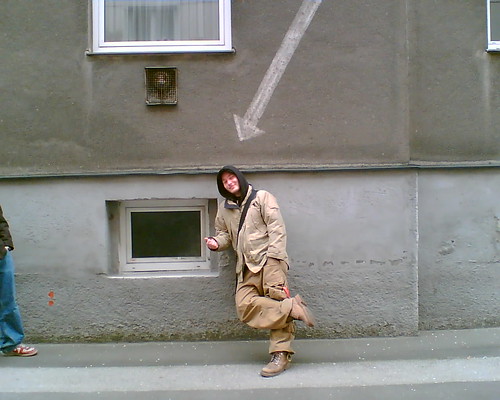POSTED BY LOTTIE CHILD - THOUGHTS ON THE NIGHT WALK
why do any particular intervention? one answer might be - just because we can - there seems value in the confidence building that playful deviation from dictated, conditioned behaviour creates. It is for each person to judge if their desired activity is the right thing to do. what i'm keen to develop and i think we did it well during the May street training sessions/workshops - is a group dynamic that can contain experimentation, allow for challenge of codes and self and at the same time be a positive intervention in space and have a positive effect on the person doing it.
Sunday, September 16, 2007
Subscribe to:
Post Comments (Atom)

2 comments:
Some fragmented and subjective reflections:
Is there a difference between exploring boundaries and leaving traces?
In the first Street Training workshops I felt that it was important to explore together what effects our actions have - on our own state of mind and self-awareness, but also on those around us. The question of whether the way we occupy space impinges on the space of others and how to share space and expand it by forming (temporary) alliances is still important to me. I felt that the format of the Ars didn't leave enough scope for that.
The project clearly attracted a lot of positive attention at the festival. I spoke with a number of people, who were interested and wanted to hear more about it, and the idea of doing nothing seemed to be quite appealing as an idea. In terms of stimulating discussions, it seemed to be successful.
I suspect that this might not have been the case without the workshops in March and May, at least not to the same extent. I think it is important for a group to be able to develop a sense of trust, an understanding of one another's needs and desires. It is probably simpler for a collection of individuals to go out and leave traces to mark "I was here", but isn't this the kind of individualism that Street Training seeks to counter? Or what effect can momentary disruptions have on our surroundings, if they do not occur within a framework where some kind of negotiation is still possible? If other people's routines and movements (drivers, for example) are disrupted, should there be some provision for those who are affected by the disruption to engage with the reason for disruption? Perhaps I just wasn't in the right frame of mind to be able to engage fully in the night walk (my eye was irritated and painful), but I kept finding myself questioning *why* some of the interventions might be interesting or desirable. Along with that, at some points I had the feeling that the documentation of our actions almost seemed to become more important than the actions themselves. Maybe there doesn't always have to be a reason for doing something, but that is the way my mind works: I feel more comfortable with reasons and explanations, rather than simply allowing the actions to speak for themselves. I would be curious to hear of other perceptions, though.
If there is interest on the part of some of the workshop participants – and it seems that there is – I would like to see the Street Training project continue, if a suitable form could be found for both explorations and reflections.
The night walk was an inspiring experience for me - I thought much about
situationism and simulation, about art and adventure, about subversion
and representation, about individuals and institutions, about pictures
and space. Sometimes I felt a bit like a teenager when I used the city
in really strange ways without being part of an "art project" - but also
without reflecting what I was doing. Sometimes (especially when dancing
around the CCTV) it was a bit too ´more of the same´... One of my main
questions (referring to Baudrillard) was: Is it possible to use the city
in a situative way and beeing part of (and being documented by) AEC at
the same time? Or is it no more than a kind of "Abenteuerspielplatz"
(adventure playground) which we need to compensate our lost wildeness?
Post a Comment